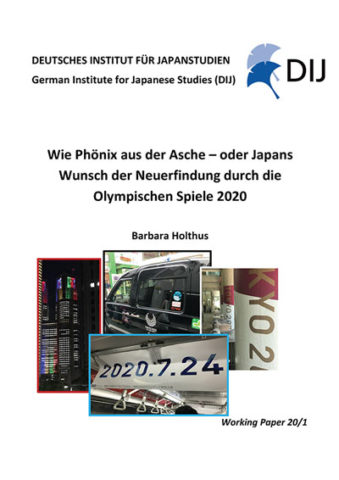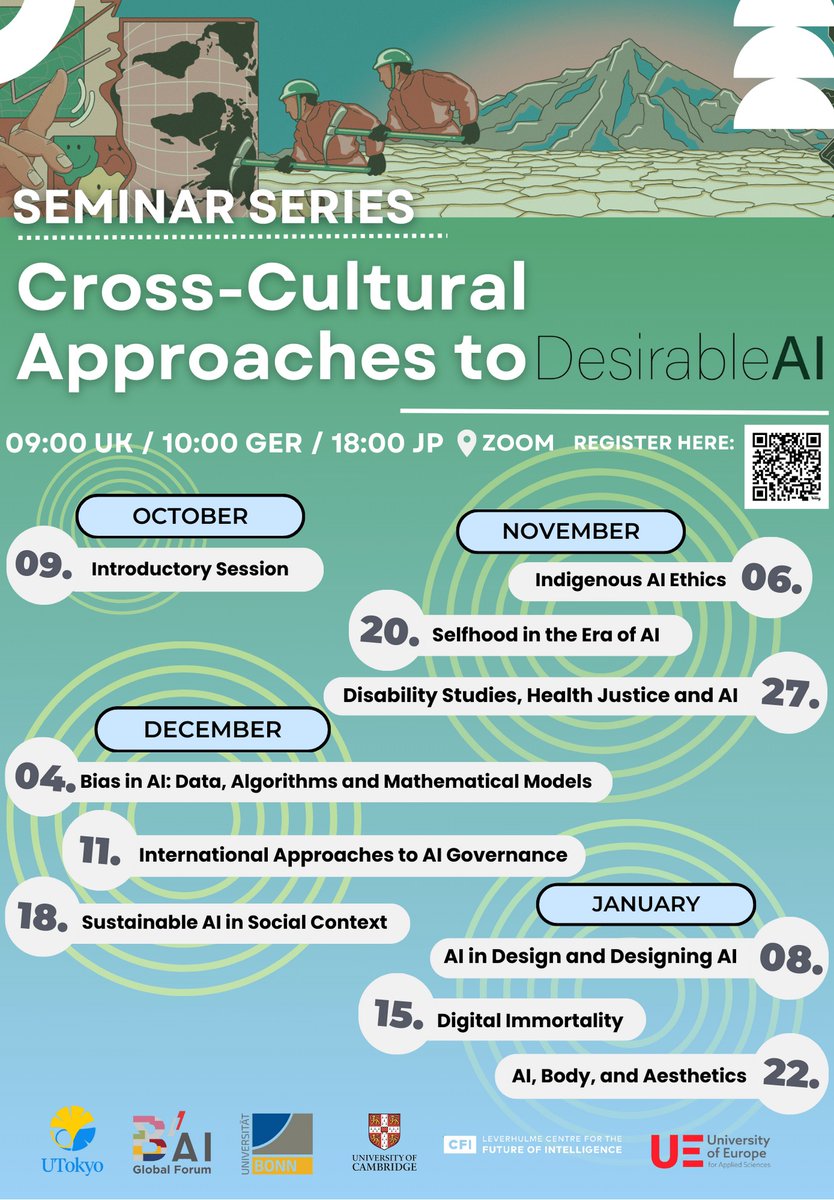Events and Activities
New Working Paper on Tokyo Olympics (in German)
 Das Jahr 2020 wird in Japan seit Jahren sowohl als Ziel und Neuanfang gehandelt, wenn die Welt für knapp 30 Tage auf das Land und ganz besonders Tokyo schaut. Stellvertretend für das ganze Land erhofft sich Tokyo, als Hauptstadt von „Cool Japan“ und als Veranstalter der technologisch versiertesten Olympischen Spiele wahrgenommen zu werden. Japan will sich als Land präsentieren, das die wirtschaftlichen Auswirkungen der demographischen Entwicklung überwunden und sich wieder an die Spitze der Welt katapultiert hat. In diesem Beitrag blickt Barbara Holthus auf diese Anstrengungen zur Neuerfindung des Landes und wie die Olympischen Spiele hierfür instrumentalisiert werden.
Das Jahr 2020 wird in Japan seit Jahren sowohl als Ziel und Neuanfang gehandelt, wenn die Welt für knapp 30 Tage auf das Land und ganz besonders Tokyo schaut. Stellvertretend für das ganze Land erhofft sich Tokyo, als Hauptstadt von „Cool Japan“ und als Veranstalter der technologisch versiertesten Olympischen Spiele wahrgenommen zu werden. Japan will sich als Land präsentieren, das die wirtschaftlichen Auswirkungen der demographischen Entwicklung überwunden und sich wieder an die Spitze der Welt katapultiert hat. In diesem Beitrag blickt Barbara Holthus auf diese Anstrengungen zur Neuerfindung des Landes und wie die Olympischen Spiele hierfür instrumentalisiert werden.
Temporary closure of the institute
Following recommendations by the Japanese Ministry of Health, Labour and Welfare regarding measures to prevent the spread of the coronavirus, the DIJ has decided to close its institute temporarily (incl. library) and to cancel all public events until further notice. We ask for your kind understanding.
The Last Cowboys of Aso? Problems of Grassland Management in Contemporary Commons – POSTPONED –
Please note: this event has been postponed. A new date will be announced in due course. We apologize for any inconvenience caused.
The transformation of the Japanese agricultural sector and the development of rural regions in the course of extensive infrastructure measures during the economic boom led to changes in many areas of rural life. Not only the often mentioned out-migration of younger generations but also the changing economic structures and the conditions for a livelihood in rural settlements were subjected to fundamental change. Among others, this also affected common work and the management of commons (common-pool resources) in the settlements, which had been embedded as a complex local system of cycles for a livelihood fitting the local environment.
By examining the grassland management of Aso (Kumamoto Pref.), I will first outline the natural conditions and then proceed to show how this transformation took place in the livestock farming sector and what problems the local population involved is currently exposed to. The lecture closes with an outlook on possible solutions, which I am currently exploring during a three-year field stay on behalf of the Japanese Ministry of Environment researching “Regionally cycling and symbiotic area” (地域循環共生圏) in order to initiate a discussion within this working group about other possible forms of sustainable development in rural Japan.
Speaker:
Johannes Wilhelm, Kumamoto University (Kumamoto)
Learning to be funny: Training and social relationships in Rakugo – POSTPONED –
Please note: this event has been postponed. A new date will be announced in due course. We apologize for any inconvenience caused.
Kabuki actors learn their skills from their fathers. Ikebana students pay their master for lessons. In contrast, artistic lineage in rakugo is not hereditary, and performers do not acquire their stories and acting skills in acting schools or from their fathers. Newcomers to the rakugo profession start their apprenticeship with a shishō, a master, without paying any compensation. For the rest of both of their lives the shishō is responsible for his deshi’s (disciple) education and accountable for his off-stage behaviour. In return, the shishō expects his deshi’s unquestioning loyalty, obedience and subordination.
The presentation provides a perspective on access to knowledge, knowledge acquisition, learning processes and structures inside Tokyo’s yose theatres, as well as social relations among the stakeholders of the rakugo world. Sarah Stark’s research is based on an analysis of printed interviews, autobiographies as well as one-on-one interviews with Tokyo rakugoka.
Speaker:
Sarah Stark, Ghent University
„Aktives Altern“ im digitalen Zeitalter. Wie kann Digitalisierung soziale Teilhabe und Inklusion fördern? – POSTPONED –
Die Bevölkerung Japans und Deutschlands altert zusehends. Vor dem Hintergrund sich auflösender Familienstrukturen, immer mehr alleinlebender Seniorinnen und Senioren und nicht mehr selbstverständlicher nachbarschaftlicher Unterstützung wird die gesellschaftliche Teilhabe und Inklusion älterer Bürgerinnen und Bürger zu einer großen gesellschaftspolitischen Heraus¬forderung. Teilhabe und Inklusion bilden die Grundlage für ein „aktives Altern“. Davon profitieren die Älteren, die Gemeinden und die Gesellschaft insgesamt. Digitalisierung und Vernetzung bieten in diesem Kontext große Chancen. Um diese nutzen zu können, müssen die Technologien allerdings zugänglich und nutzbar gemacht werden. Aus diesem Grund ist es wichtig, „digitale Kompetenzen“ unter der älteren Bevölkerung zu fördern. Im Rahmen des Symposiums soll erörtert werden, was in Japan und Deutschland unternommen wird, damit die ältere Generation von den Vorteilen der digitalen Transformation im Hinblick auf Teilhabe und Inklusion profitieren kann.
Sprachen: Deutsch und Japanisch mit Simultanübersetzung
DIJ Senior Research Fellow awarded prestigious dissertation prize
Harald Kümmerle, senior research fellow at the DIJ since January of this year, has been selected as the recipient of the Johannes Zilkens Dissertation Prize 2020. Every year, the German Academic Scholarship Foundation (Studienstiftung des deutschen Volkes) awards this prize for an outstanding dissertation from the humanities and social sciences. It is endowed with 5,000 euros.
Kümmerle has defended his dissertation on the “Institutionalization of mathematics as a science in Meiji- and Taishō-era Japan” at Martin Luther University Halle-Wittenberg in January 2019. According to the interdisciplinary jury, it “impressively bridges mathematics, Japanese Studies, and social sciences”. The work gives “important impulses for the advancement of Japanese Studies, and extending beyond this, for the understanding of the development of sites of science and the organization of knowledge transfer”.
Why Is It So Difficult to Buy a Ticket for the Musical?
Adaptive Innovation in Japanese Musical Theater from the 1960s to the Present
This presentation will offer an overview of Japanese popular musical theater focusing on its systematic and strategic adaptation for the growing and changing needs of its diversifying audience groups. In the past decades, Japanese popular musical theater has drastically transformed, expanding its presence in the domestic entertainment industry by ticket distribution adaptive to new communication systems for better accessibility and consumability.
Speaker:
Rina Tanaka, Meiji University
Money, parenting and happiness: A comparative and historical perspective
Money and parenting are two key factors that can bring considerable joy or misery to our daily lives. Empirical studies have shown that while money is generally associated with greater happiness, having small kids can actually be a source of unhappiness, especially for women. In this session, two experts – a sociologist and an economist – explore the intricate relationship between money, parenting and happiness, from a comparative and historical perspective.
Speakers:
Hiroshi Ono, Hitotsubashi University Business School
Matthias Doepke, Northwestern University








 Open Access
Open Access
